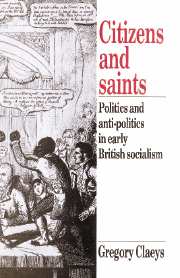Book contents
- Frontmatter
- Contents
- Acknowledgements
- List of Abbreviations
- Introduction:
- PART I THE ROOTS OF POLITICAL AND ANTIPOLITICAL SOCIALISM
- 1 Republicanism, puritanism and natural jurisprudence
- 2 Paternalism and democracy in the politics of Robert Owen
- PART II SOCIAL SCIENCE, POLITY AND ECONOMY
- PART III THE ORIGINS OF SOCIAL RADICALISM
- Bibliography
- Index
1 - Republicanism, puritanism and natural jurisprudence
Published online by Cambridge University Press: 04 December 2009
- Frontmatter
- Contents
- Acknowledgements
- List of Abbreviations
- Introduction:
- PART I THE ROOTS OF POLITICAL AND ANTIPOLITICAL SOCIALISM
- 1 Republicanism, puritanism and natural jurisprudence
- 2 Paternalism and democracy in the politics of Robert Owen
- PART II SOCIAL SCIENCE, POLITY AND ECONOMY
- PART III THE ORIGINS OF SOCIAL RADICALISM
- Bibliography
- Index
Summary
Happy, indeed, would it be for mankind if the delegates of all civilised nations were to assemble in congress and submit their various institutions and customs to a strict comparison and scrutiny, and then synthetically form a scheme of universal polity. This could not be a Utopia, according to the general misapplication of that term, but a system deduced from experience upon the clearest principles of science.
(John Minter Morgan, Hampden in the Nineteenth Century: or, Colloquies on the Errors and Improvement of Society, 1834, vol. 1, p. iii)Three modes of thinking about government underlay Owenite attempts to design the ideal polity: republicanism, in both its eighteenth century country and ancient forms; radical puritanism, especially in the shape of Quakerism; and natural jurisprudence, upon which much late eighteenth-century moral philosophy and political economy was based. Though their components can be separately analysed, the divergencies between these traditions (at least as contemporaries understood them) should not be exaggerated. In the revived radical political discourse of the late eighteenth century, many reformers saw these approaches to politics as mutually reinforcing rather than conflicting responses to similar problems. Republicanism stressed the need for popular sovereignty, participation and public virtue in order to avoid ‘corruption’ resulting in the tyranny of one or of the few. Quakerism indicated the possibility of a purer and more stringent form of social morality. Natural law, as the reformers read it, centred upon rights as the basis of political legitimacy, tended to be concerned with the preservation of individual liberty against the encroachments of state power, and focussed correspondingly more upon individuals in their civil than in their political capacities.
- Type
- Chapter
- Information
- Citizens and SaintsPolitics and Anti-Politics in Early British Socialism, pp. 23 - 62Publisher: Cambridge University PressPrint publication year: 1989

